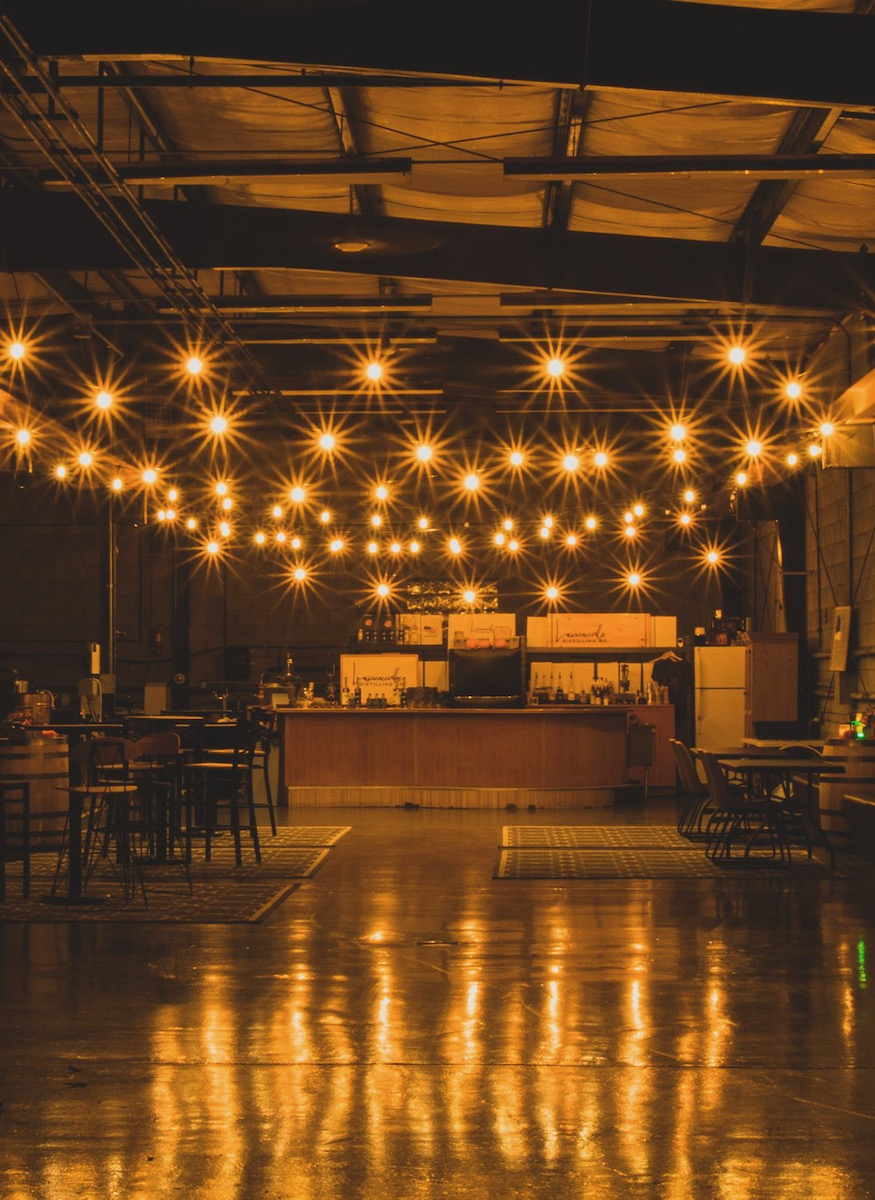Joe Degroot of Lawrenceville Distilling named his absinthe after a haunted house, 1129 Ridge Avenue. The supposed most “the most haunted house in America” is now little more than a vacant lot, and the sordid affairs and grisly murders turned out to be stories amplified by crime bloggers and amateur sleuths.
The truth of the collective fixation on 1129 Ridge Avenue was almost stranger than the fiction itself. “The lies and misinformation around the haunted house story parallels the history of lies and misinformation around absinthe,” Degroot said. Two of those pieces of misinformation Degroot has worked to combat: Absinthe in America isn’t “real absinthe,” and absinthe makes you hallucinate.
“The green stuff that the artists and poets and the people on the fringe were drinking, that’s the bad stuff.”
The first is a myth that comes from a misconception that American absinthe can’t use wormwood and the second a byproduct of anti-absinthe marketing in the 1800s. “There was partnership between the temperance movement and the wine industry. They said not all alcohol is bad, but the green stuff that the artists and poets and the people on the fringe were drinking, that’s the bad stuff,” Degroot said.
Though absinthe might not actually make you hallucinate, the complexities of its history and production can captivate and transfix all the same. Degroot first encountered absinthe in a Sazerac in New Orleans and was blown away by its nose and taste. “It was a pinnacle moment for me for my love of absinthe,” he remembered.
When Degroot speaks, his passion for absinthe comes through in the level of detail he describes it with. Part of what’s so enjoyable about speaking to Degroot is that you know you’re talking to someone who cares deeply about their craft and sharing it with others. A math and science teacher by trade, his experiences with absinthe as a cocktail ingredient led him to his interest in distilling it himself. Degroot wanted to go right to the source—the original French recipe from 1855. Because absinthe was illegal in the United States until 2007, information on it can be scant and absinthe devotees scour forums for tips on making it.
“I had my eureka moment to start using wine from there.”
“Distilling is one of those things it’s really difficult to learn how to do it without catching yourself in a situation where you’re doing something illegal,” he said. “Me and my team had to work to decipher this hand-written French recipe. I learned from my deep dive on forums to take wine and distill it, instead of using GNS—grain neutral spirits. I had my eureka moment to start using wine from there.” He uses sweet white wine grapes and doubly distills them to the point where they are unrecognizable as wine. Each batch has a specific number, and as the distiller he can tell them apart by taste.
Degroot formally opened Lawrenceville Distilling in 2018, long after absinthe became legal. It’s a tasting room, not a bar, unique for its location in an old garage on a Lawrenceville side-street. The previous owner had covered the space wall-to-wall with his car collection. Now, Degroot has a wide open, post-industrial chic space for both his customers and his distilling room where he makes absinthe, gin, vodka, and bourbon. He serves a green absinthe traditionelle, a red absinthe rouge, and then an absinthe blanc in the Swiss style of absinthe distilling. The Swiss recipe uses grain rather than grapes.
“We try to challenge ourselves to create elevated cocktails that showcase our spirits.”
The quiet location on Harrison Street gives Lawrenceville Distilling an in-the-know speakeasy feeling. “We’re not trying to be a bar, at the end of the day, we’re a tasting room,” he said. “We try to challenge ourselves to create elevated cocktails that showcase our spirits as a main base ingredient. Sometimes we get people that do think they’re walking into a bar and ask for tequila or what’s on tap for beer. I tell them there’s two great breweries nearby. We try to offer a different experience than a bar.”
That experience is a mellower space where the unique menu and care taken with distillation takes center stage. It becomes a destination spot for people who like it, boosted by how easy it is to find parking in the empty lots of Upper Lawrenceville. You can order in food and start a night out on Butler Street there, or simply hang around and enjoy the space’s ambiance in its booths and tables.
One of the perks to Lawrenceville Distilling is that on the nights when Degroot hasn’t booked a band, the space’s size and tucked away location means it doesn’t have the overlapping chatter of a tiny, packed bar with TVs blaring. It’s a great spot to take a friend you actually want to talk to. The tasting room is both mellow and also aesthetically pleasing with its sweeping cinder block walls and widespread natural light from the garage doors. I first visited it for a figure-drawing session at a Burlesque show, true to the countercultural roots of absinthe making. Degroot brings in both quirky, underground acts he scouts from open mics alongside national comedy and music acts.

“More often than not, people are pleasantly surprised by it.”
“We always get people that are curious about absinthe,” he said. As we spoke, someone came in and asked him about how to prepare absinthe at home. He advised them on using a three to one ratio of cold water to absinthe in a louche to isolate its flavor and soften the high-proof intensity. Degroot’s absinthe is 69% alcohol, so if someone asks for a shot, he turns that down on the grounds that it’s both irresponsible and won’t allow the consumer to really enjoy it.
“The thing that’s most polarizing about absinthe is its flavor. If somebody’s never had it before and they’d like to try it, we’ll louche a glass of absinthe in front of them. Then, we’ll let them taste it. More often than not people are pleasantly surprised by it,” he explained. He likens the louched flavor to the anise undertone of pizzelle cookies more than black licorice.
Degroot encourages people curious about absinthe to just try it, and to see drinking as something to enjoy, not just to do shots until you pass out. If absinthe isn’t for you, Lawrenceville Distilling has its Parking Chair Vodka brand and Ginzer gin, which are both equally high-quality. “We take what’s in the bottle very seriously, but we don’t take ourselves too seriously,” he said, referencing the quirky, Pittsburgh-specific names of his spirits. In the coming year, he plans to expand the distillery to two new locations, but will continue serving out of the garage on Harrison Street his customers have come to love. “I’m proud that I can do something absolutely authentic that’s close to what people would have been drinking in cafés in Paris in the 1800s.”
Story by Emma Riva / Photography by Dave Bryce
 Subscribe to TABLE Magazine‘s print edition.
Subscribe to TABLE Magazine‘s print edition.
